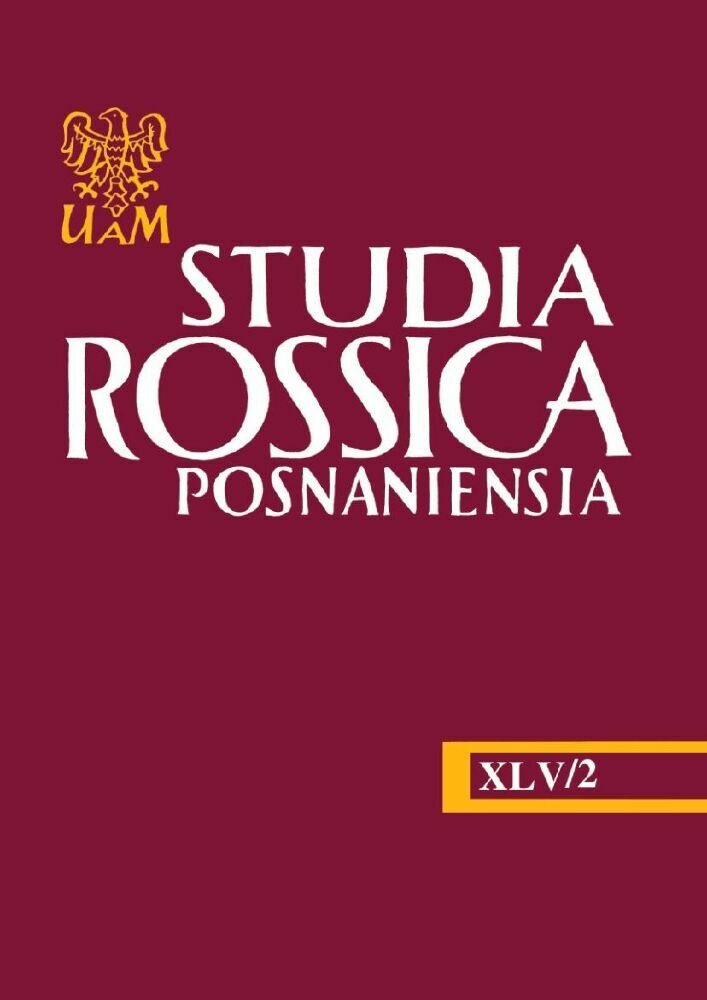Abstrakt
The article analyses 2nd person singular perfect forms in a collection of Old Russian documents of the 14–16th centuries. The main focus is placed on their formal aspects and the transition from an analytic to synthetic form. The process itself is well-known, yet it still lacks a detailed description and fully explained reasons for its occurrence. The author, providing statistical data on the use of the auxiliary verb byti and explicitly expressed subject, proves its great regularity. There is a strong dependence between the two items and usually only one of them is applied with perfect constructions. This shows that the function of the auxiliary verb has been completely changed and in the period described it played only the role of a person indicator. Thus, it became redundant when the use of personal pronouns was increased. All the exceptions to this rule are scarce and can be explained with factors of a syntactical or extra-linguistic character. The author’s assumptions are confirmed with statistical data and examples taken from spiritual and contractual charters of grand princes and appanage princes in the XIV–XVI centuries.
Bibliografia
Âkubinskij, Lev Petrovič. Istoriâ drevnerusskogo âzyka. Moskva, Gosudarstvennoe učebno-peda-gogičeskoe izdatelʹstvo Ministerstva Prosveŝeniâ RSFSR, 1953.
Bahrušin, Sergej Vladimirovič, ed. Duhovnyâ i dogovornyâ gramoty knâzej velikihʺ i udělʹnyhʺ. Moskva, Tip. Vilʹde, 1909.
Bahrušin, Sergej Vladimirovič, ed. Duhovnye i dogovornye gramoty velikih i udelʹnyh knâzej XIV–XVI vv. Moskva–Leningrad, Izdatelʹstvo AN SSSR, 1950.
Gasparov, Boris Mihajlovič. “Nablûdeniâ nad upotrebleniem perfekta v drevnecerkovnoslavânskih tekstah”. Russkij âzyk v naučnom osveŝenii, 1 (5), 2003, p. 215–242.
Kuznecov, Petr Savvič. Istoričeskaâ grammatika russkogo âzyka. Morfologiâ. Moskva, Izdatelʹstvo Moskovskogo universiteta, 1953.
Markova, Tatʹâna Damirovna. “Drevnerusskij perfekt v aspekte realizacii funkcionalʹno-seman-tičeskoj kategorii temporalʹnosti”. Vestnik Čelâbinskogo gosudarstvennogo pedagogičeskogo universiteta, 1, 2013, p. 247–259.
Markova, Tatʹâna Damirovna. “Osobennosti upotrebleniâ form perfekta v slavâno-russkom Prologe XVI veka”. Vestnik Nižegorodskogo universiteta im. N.I. Lobačevskogo, 4, 2010, p.636–638.
НовыйзаветГосподанашегоИисусаХриста, ЕвангелиеотИоанна. Web. 11.10.2019. http://www.orthodic.org/gospel/verses/book/4/chapter/17.
Šulʹga, Mariâ Vladimirovna, ed. Istoričeskaâ grammatika russkogo âzyka. Morfologiâ. Glagol. Moskva, Akademizdatcentr Nauka, 1982.
Waraczewski, Maciej. “Osobennosti upotrebleniâ vspomagatelʹnogo glagola v formah perfekta v 1-m lice edinstvennogo čisla v drevnerusskih gramotah XIV–XVI vv.”. Studia Rossica Posna-niensia, vol. XLIV, 1, 2019, p. 381–389.
Zaliznâk, Andrej Anatolʹevič. Drevnerusskie ènklitiki. Moskva, Izd-vo Âzyki slavânskih kulʹtur, 2008.
Abbreviations used
Bahrušin, Sergej Vladimirovič, ed. Duhovnye i dogovornye gramoty velikih i udelʹnyh knâzej XIV–XVI vv. Moskva–Leningrad, Izdatelʹstvo AN SSSR, 1950.
Licencja
PRACE PUBLIKOWANE W CZASOPIŚMIE DOSTĘPNE SĄ NA LICENCJI CREATIVE COMMONS:
Uznanie autorstwa-Użycie niekomercyjne-Na tych samych warunkach 4.0 Międzynarodowe.
Autorzy tekstów przyjętych do publikacji w czasopiśmie „Studia Rossica Posnaniensia” są zobowiązani do wypełnienia, podpisania i odesłania na adres redakcji umowy o udzielenie nieodpłatnej licencji do utworów, z zobowiązaniem do udzielania sublicencji Creative Commons.
Zgodnie z umową, autorzy tekstów opublikowanych w czasopiśmie “Studia Rossica Posnaniensia” udzielają Uniwersytetowi im. Adama Mickiewicza w Poznaniu niewyłącznej i nieodpłatnej licencji oraz zezwalają na użycie sublicencji Attribution-NonCommercial-ShareAlike 4.0 International (CC BY-NC-SA 4.0).
Autorzy zachowują prawa do dalszego, swobodnego rozporządzania utworem.
Autorzy, którzy wykorzystują w swoim tekście cudze utwory (np. ilustracje, fotografie) proszeni są o dostarczenie do redakcji czasopisma zgody na publikację.
Użytkownicy internetu uprawnieni są do korzystania z utworów opublikowanych po 2015 roku “Studia Rossica Posnaniensia” tylko w celach niekomercyjnych, pod następującymi warunkami:
https://creativecommons.org/licenses/by-nc-sa/4.0/
Uniwersytet im. Adama Mickiewicza w Poznaniu zachowuje prawo do czasopisma jako całości (układ, forma graficzna, tytuł, projekt okładki, logo itp.).

